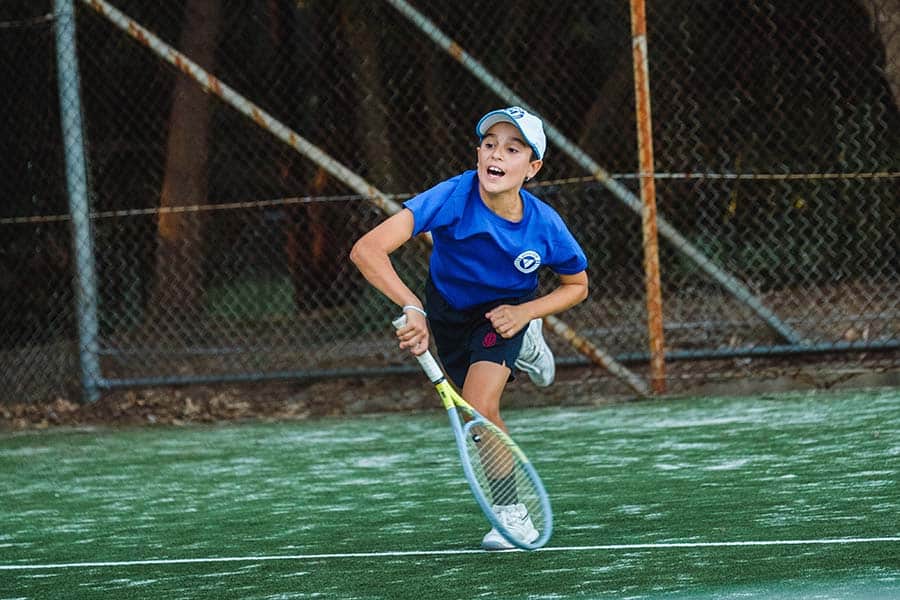
Tennis must be one of the most challenging sports for competitors to deal with. Think about a weekend tournament with a draw of sixty-four players. At the end of the tournament, there is only one winner and sixty-three losers – a staggering 98% of players will lose. If you compare that to a weekend game of competitive soccer, only eleven players out of the twenty-two can lose, and all twenty-two may come away with a draw. Tennis is a gladiatorial sport that can be lonely, but it is also one where players can learn to deal with adversity and build resilience.
Why is it so hard to be a good tennis parent?
Your communication as a parent is the most powerful determinant of your child’s mental and character development. Parents have a crucial role in helping to build their child’s resilience on and off the tennis court and it’s easy to underestimate how hard it is to be a ‘good’ tennis parent. You need to be able to control your own emotions and be a supportive role model for your child.
Many parents instinctively know the right actions and behaviours to communicate to their child in a tennis setting, yet most have difficulty with implementation. Watching your child play tennis can be like watching your own DNA run around a court and compete, so it’s difficult to separate yourself from your emotions in the heat of a match to provide support. Parents will often describe feeling the same types and intensity of emotion as their child, the only difference being that the child can take action while the parent has to sit outside the court, helpless to influence the outcome of the match.
A parent watching their child play can often experience heightened emotions such as anger and frustration when they need to be displaying neutral or supportive body language if their child looks their way after losing a point. Likewise, after a lost match, a parent may be experiencing intense negative emotions, but at the same time they need to be supportive and provide unconditional love. The post-match moment is often a difficult one for both player and parent.
Knowledge combined with practice will hopefully lead you to becoming a tennis parent who has a strong and positive impact on your child.
The crucial moments on match day
Frank Giampaolo in his book The Tennis Parent’s Bible puts it succinctly: on match days, the primary role of parents is to de-stress their child.
Match days can be very stressful and stressed athletes can be fearful, which increases muscle contractions, impairing movement, judgement and problem-solving skills. Tennis players perform best in calm, relaxed mental states.
Pre-match preparation
Aside from creating an environment that is as stress- free as possible, parents can also guide their child through developing a match plan (we have a template available at voyagertennis.com) their nutrition and hydration requirements, and establishing warm-up routines. It’s important to note the parents’ role here is to guide their child to create a plan, not do all the planning for them.
During the match
It’s incredibly difficult not to get caught up in the emotions of a match, so one way to distance yourself is to focus on analysing the match. Evaluate dispassionately how your child is playing relative to their match plan alongside their technical, tactical, physical and mental performance. There are a number of apps available which you can use to statistically analyse your child’s performance.
Post-match communication
There are certain times when your child’s mind is open to being influenced, and as a parent you need to be aware of this. There are two important times to consider when your child’s character development is most easily influenced.
The first is when your child is experiencing high levels of emotion. Research has shown that when an experience is unemotional, our brain doesn’t remember it with much strength, but when an experience arouses high levels of emotion, our brain recognises it as important and becomes more plastic and easily rewired. This is the foundation for how we remember things.
The second critical time is after exercise. Through evolution, we have been primed to recognise experiences following exercise as important to remember, and the brain is then much more open to being rewired and influenced.
The messages you communicate (either verbally or non-verbally) when your child is experiencing high levels of emotion, or post exercise, will have a much bigger influence on them than at any other time. A perfect example of both situations would be when your child comes off the court after a long tennis match, particularly when they’ve lost.
There are two crucial messages that you can communicate during this period that will be of great benefit to your child’s character and self-esteem:
- That your love for them is unconditional and not dependent on whether they won or lost the match
- That you believe their effort rather than performance will pay off in the long term
When you’re communicating these messages, consider that your child will also be picking up on all of your non-verbal communications such as eye contact, facial expressions, tone of voice, body position, gesturing, and the timing and intensity of your responses. That is why it’s important that your verbal and non-verbal communications are aligned.
There are some things that you can do to help manage this:
- Prior to the end of the match, go through a mental checklist of how you want to behave. Have a routine that is the same, no matter a loss or a win, whether that is a high five, a hug, or whatever else works for you and your child.
- Use questions to find out what your child learned from the match after they have had time to settle down from the post-match euphoria or despondency. Ask them:
- What did you learn about your game?
- What did you learn about your opponent?
- How well did you execute your game plan?
- How was your body language?
- How was your attitude on court?
- Out of ten, how much effort did you put in?
If you can write down the learnings, that’s great, but always finish by emphasising the positives with words of encouragement.
As tennis parents, you will no doubt have seen some behaviour that is different from this. We have seen a lot of extreme behaviour, such as a parent coming on court and smashing their child’s racquets, shouting at their child, or driving off in disgust and leaving their child to make their own way home. We don’t condone this, of course, but it shows how invested parents can become and how difficult it is in the heat of the moment to behave supportively.
Beyond managing the post-match cauldron of emotions, you will encounter a number of other times where how you interact with your child will be as important as what you do. Hopefully, our tips will help.
Anthony Ross, Coaching Mentally Tough Tennis: Lessons from the trenches (2015)
F. Giampaolo, The Tennis Parent’s Bible: Second Edition (CreateSpace Independent Publishing Platform, 2016)
James L. McGaugh, ‘The Amygdala Modulates the Consolidation of Memories of Emotionally Arousing Experiences’, Annual Review of Neuroscience (2004) www.annualreviews.org/doi/abs/10.1146/ annurev.neuro.27.070203.144157
By Ryan Henry, Managing Director of Voyager Tennis and Ex-Pro Tennis Player




